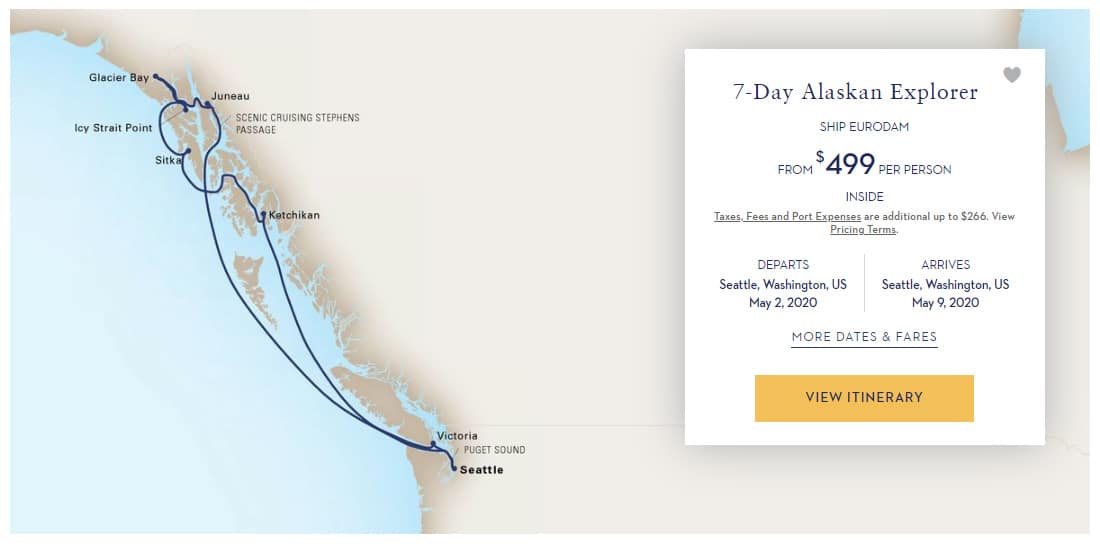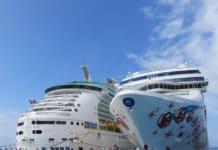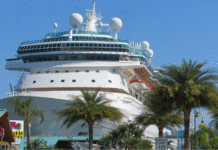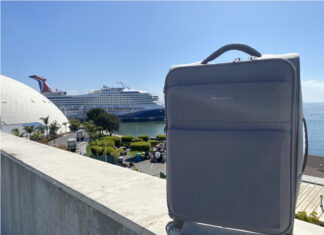Note: We have updated our original article (featured below) following news that Canada has extended its cruise ship ban until October 31.
While cruise lines are hopeful to return to sailing starting in August, any hopes for at least a partial Alaskan cruise season now seem gone.
Canada just announced it is extending its current ban on large passenger ships until October 31, 2020:
The Government of Canada continues to monitor the evolution of the COVID-19 pandemic and the impacts it is having on the marine and tourism sectors. Keeping Canadians and transportation workers safe during the COVID-19 pandemic is Transport Canada’s top priority.
Today, the Minister of Transport, the Honourable Marc Garneau, announced updated measures pertaining to cruise ships and passenger vessels in Canadian waters.
- Cruise ships with overnight accommodations allowed to carry more than 100 persons are prohibited from operating in Canadian waters until October 31, 2020.
- As of July 1, 2020, all other passenger vessels must follow provincial, territorial, local and regional health authority requirements for timelines and processes to resume operations.
Previously, Canada had banned ships until at least July 1 following the public health crisis.
How a Canadian Ban Impacts Alaskan Cruises
Why does Canada have a say in the Alaskan cruise season?
By U.S. law, foreign-flagged vessels (which nearly all cruise ships are) must visit a foreign port before returning back to the United States.
As Carnival mentions on their website:
“As a general rule, a foreign-flag vessel like Carnival’s vessels may transport passengers on round-trip voyages originating in the United States if the vessel stops at a nearby foreign port during the course of its voyage. This type of voyage can also include stops at U.S. ports where passengers can go ashore for sightseeing and shopping, so long as the passengers do not permanently disembark at those U.S. ports. Nearby foreign ports include Canada, Mexico, Central America, Bermuda, and most Caribbean Islands.”
On trips to Alaska, which most often sail from Seattle, cruise lines add a Canadian stop — almost always Victoria, Canada — to comply with the law. If Canada says that cruise ships can’t stop, then that means most lines can’t easily comply with the U.S. law regarding a stop in a foreign port.
In reality, the original ban didn’t end up making a difference as cruises are currently suspended in the United States anyway. But with ban extended to the end of October, there’s a good chance it will have an impact.
The majority of the Alaskan cruise season runs from May through September, with July and August being busy months. There are also some sailings that go as late as October.
Many cruise lines are tentatively preparing to return at the start of August. If they return then, at least Alaskan cruises look like they will still have to be cancelled.
Original article, published March 16, 2020:
The Canadian government announced on Friday that it will delay the beginning of the cruise season in that country from April 2 until at least July 1, in another blow for the cruise industry.

In a statement, the government said the policy applies to ships that carry more than 500 people:
“As a response to COVID-19, the Government of Canada will defer the start of the cruise ship season in Canada, from April 2, 2020, to July 1, 2020, at the earliest. This deferral will apply to cruise ships capable of carrying more than 500 passengers and crew members.”
This new rule means that the start of the Alaskan cruise season in the United States is also likely halted for months.
Why does Canada not allowing cruises impact sailings to Alaska?
Due to U.S. laws, foreign-flagged vessels (which almost all cruise ships are) must make a stop in a foreign country before returning back to the U.S. to debark passengers. That’s why cruises don’t just sail American itineraries and always go to foreign ports of call.
Typically this means Alaskan cruises sailing from Seattle to Alaska and back make a quick stop in Canada before returning. The stop is usually in Victoria, British Columbia, which is the closest foreign port to Seattle. Meanwhile, some Alaskan cruises depart from Vancouver. Following the announcement, both ports are off the table for the time being.
Given the geography, there is no alternative country that the cruise ships could easily port at outside of the United States. In effect, the Canadian government has seemingly closed the Alaskan cruise season until mid-summer at the earliest.
“The safety and security of Canadians is a top priority,” said the Canadian Minister of Transport, Marc Garneau. There is no immediate solution to allow cruise ships to operate in Canada while adequately containing the public health risk associated with COVID-19, other than delaying the start of the cruise ship season. We do not take these decisions lightly and will continue to reassess as the situation evolves.”
Port of Seattle Response
The announcement over the weekend seems to have everyone from ports to cruise lines playing catch-up.
The Port of Seattle issued a statement saying:
“All aspects of the Port’s operations are impacted by the global response to COVID-19, including Canada’s decision to suspend its cruise season. Maintaining the health, safety, and wellbeing of our community is our top priority. The Port has already cancelled the first two sailings of its season, originally scheduled for April 1 and 5.
“We are reviewing Transport Canada’s actions and evaluating the order’s impacts on the 2020 Alaska cruise season. The pace of change and scale of operational impact is significant, and we will continue to work closely with stakeholders on next steps.”
Meanwhile, in our checks the cruise lines still have Alaskan sailings available to book that sail before July 1 and include Canadian ports of call. Take a look:


Given all the news that’s happened in the past few days regarding cruising, this may have just been overlooked.
A statement from Holland America on Twitter stated that “Today it was announced that Transport Canada has suspended the cruise season across Canada until July 1, 2020. We will be evaluating our Alaska and Canada & New England cruises within this time frame and share information as soon as we have it. Thank you for your patience.”
It was just Friday that the entire industry announced a 30-day suspension of U.S. cruises in response to the outbreak, with cruises set to resume in mid-April. Canada’s date is another two-and-a-half months beyond that return to sailing.
What If My Alaskan Cruise is Before July 1?
If you are already booked on an Alaskan cruise, then it certainly appears that it will be cancelled unless some sort of agreement can be worked out. This could mean that either the United States eases the rules on foreign-flagged vessels or the Canadian government lifts its July 1 deferral.
Should your sailing be cancelled, then you should get some sort of compensation. In the case of trips cancelled recently as cruise lines suspended operations, the refunds were generous.
Most cruise lines offered passengers two options.
First, many lines have allowed guests to adjust the date of their booking and receive a 125% fare credit. So if you paid $2,000 for your cruise, then you had $2,500 in credit to spend on a future trip.
The alternative is that cruise lines are simply allowing passengers to receive a 100% refund of their full cruise fare back.
We have yet to see any official cancellation policies related to Alaskan cruises impacted by this policy. We would expect a similar refund plan for passengers if their cruises are cancelled due to the Canadian announcement.
Of course, there is still plenty of time between now and July 1 to see if some solution can be worked out to allow the cruises to sail as scheduled.











